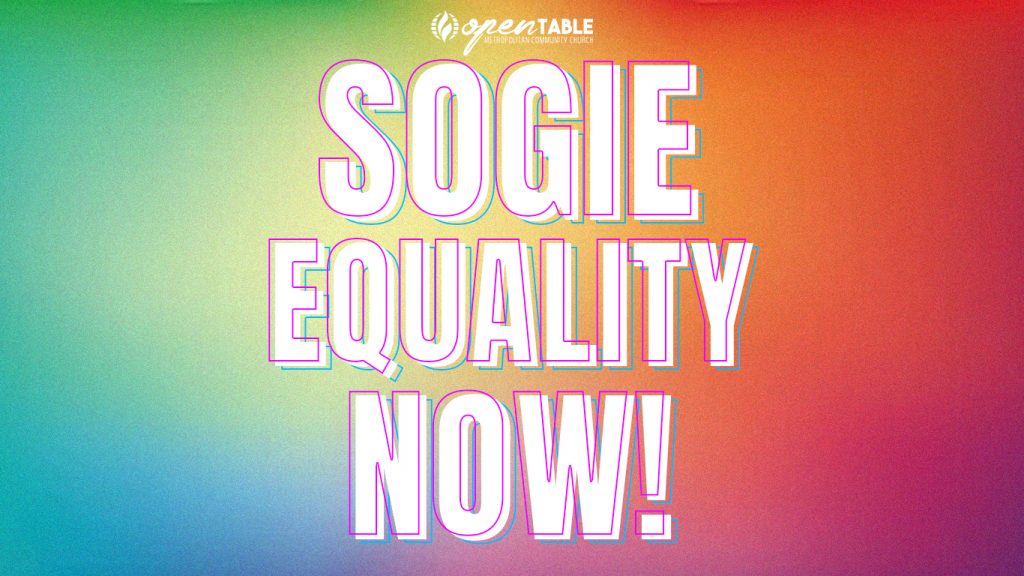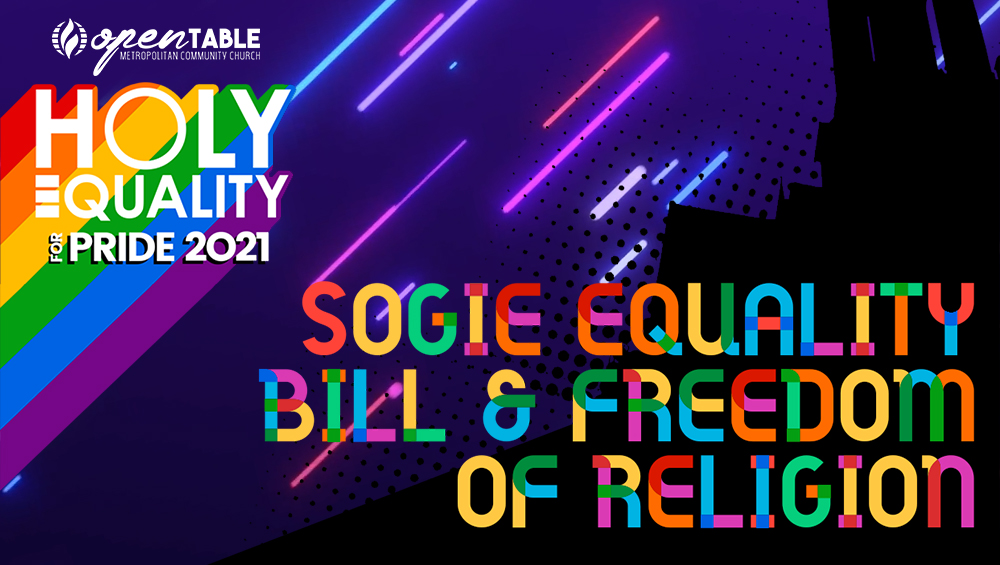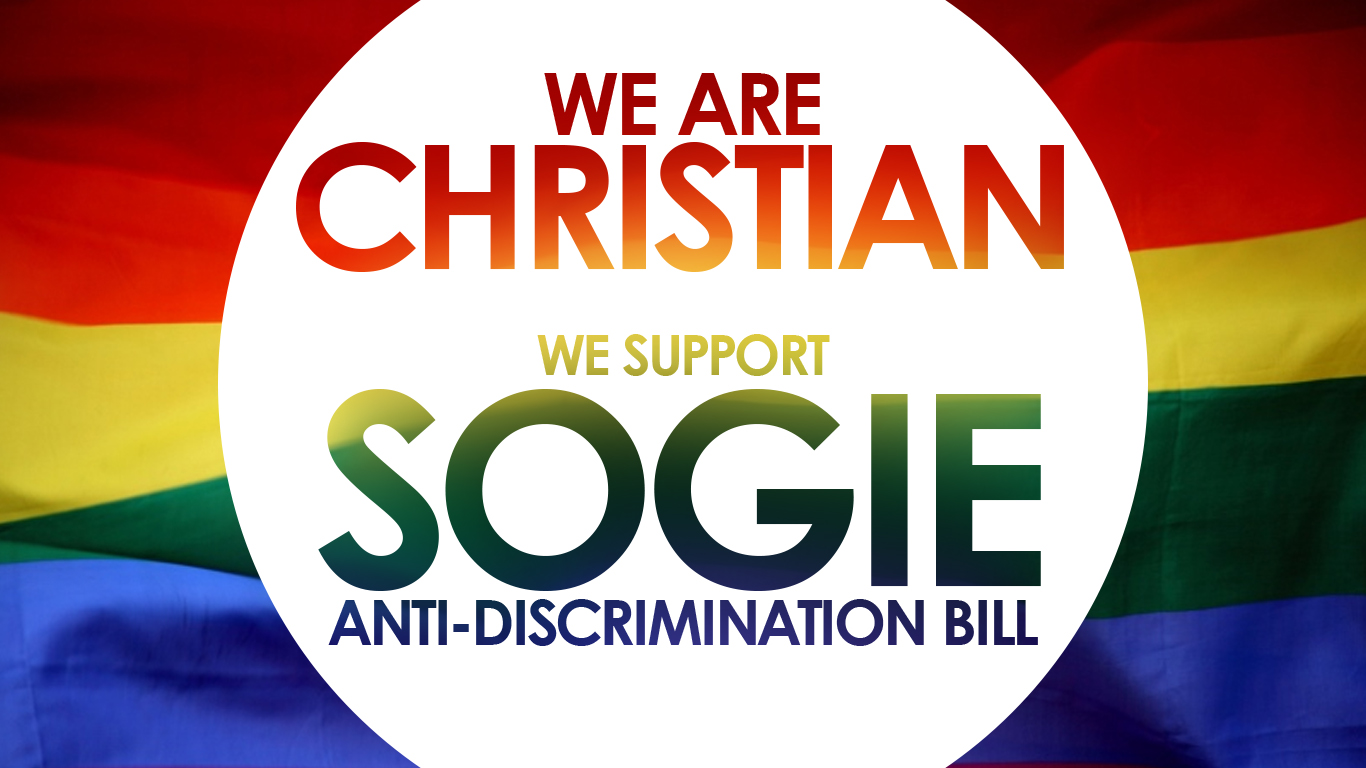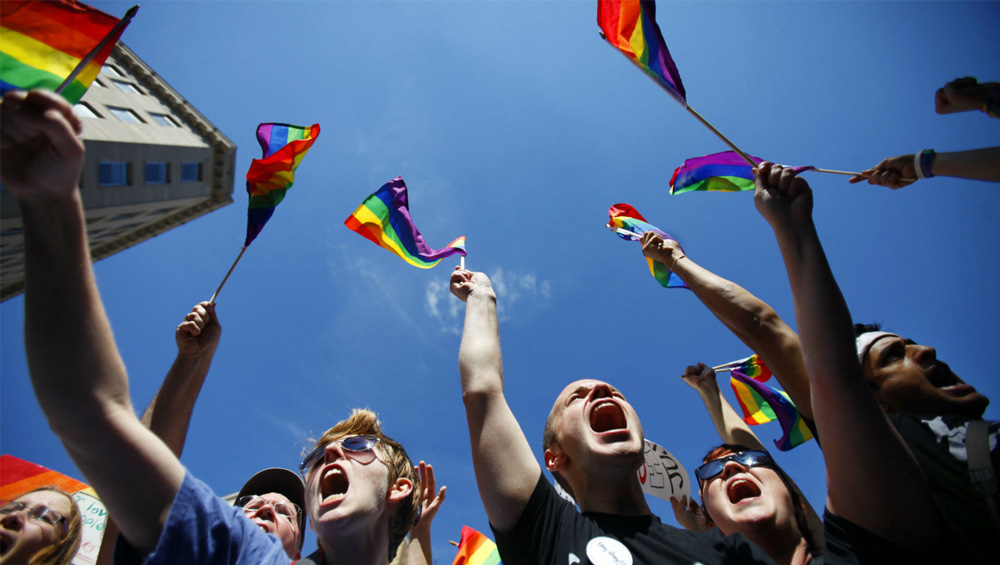One of the primary reasons for opposing the SOGIE Equality Bill by powerful and influential religious groups is what they imagine or project as the possible persecution of their freedom of religion and freedom of speech. Open Table Metropolitan Community Church is also a faith-based organization, and we value those same rights of freedom of religion and speech. We are united and one with all our Christian brothers, sisters, siblings, and all other faith communities in the call to ensure that the State does not infringe upon these rights of individuals and organizations. Open Table MCC and I, as its Pastor, recognize and support the right of any individual or organization to teach and preach within the confines of their church facilities and worship centers and in their seminaries and bible schools. We also recognize and support the right of every person of faith and their faith-based institutions to proclaim whatever belief and system of belief they have. Above all, we support all religions’ commitment and zeal to proclaim love and compassion wherever and whenever.
At the same time, we also uphold the life, dignity, and rights of all Filipinos, including LGBTQI+ persons. In the same way that our 1987 Constitution and democratic principles recognize to protect and honor minorities,such as women, children, elderly, and indigenous peoples, it is also necessary and urgent that we protect and safeguard the life, dignity, and rights of every LGBTQI+ Filipino by passing a SOGIE anti-discrimination law.
In talking about human rights and democratic principles, we know that no right is absolute. One person’s rights end at the border of another person’s rights. The right to religion and speech has the responsibility and limitation not to impose their beliefs upon the lives and rights of other Filipinos who do not share such beliefs and are not part of their religious association. Freedom of religion does not mean to say that one religion, no matter how dominant, influential, or wealthy, can dictate or become the basis of the laws of the land. Equally, any law that upholds and recognizes the rights of LGBTQI+ people should not force churches to accept beliefs and practices that they are opposed to.
Bawat karapatang pantao ay may kaakibat na mga responsibilidad at limitasyon. Ano ang limitasyon? Ang isang karapatan ay hindi pwedeng gamitin para saklawan ang buhay, dignidad, at karapatan ng iba. Bawat karapatan ay nagtatapos din sa hangganan ng pagkilala ng buhay, dignidad, at karapatan ng iba.
Ergo, the right to freedom of religion and speech cannot infringe upon the right to life, dignity, security, and other rights of all other people who do not share the same religious beliefs, practices, and associations.
Something that is also very basic in constitutional law, lest I am mistaken since I am not a lawyer, religion and religious ideas cannot be the prime motivation and basis of any law in a secular republican state. Lest we forget, the Philippines, as a democratic republic defined and guided by its Constitution, is secular, which means there is a clear recognition of the diversity of Filipinos in their cultural, religious, non-religious, regional, linguistic, ethnic, gender, and many other identities, backgrounds, and categories, and we daresay, including the SOGIESC. Even when words like “ethical and spiritual values” are mentioned in the Constitution, it does mean to say or refer to any specific religion or spiritual tradition. It is simply a recognition that “spiritual” is part of the life of many Filipinos, even if they are diverse in what they mean by spiritual.
Despite Christianity being splintered into many different denominations and sects, it remains the dominant religious group — Roman Catholicism being the most dominant among them all. Nonetheless, predominance in numbers is inconsequential if we take the secularity of the State seriously.
Even as human rights and democratic principles recognize the right to religious belief and practice, the development of modern-day democratic and republican governments and societies learned how problematic, violent, and chaotic it is to use any single religion as the basis of law and governance. Such learnings came from the long history of religious-political wars in Europe and many other places in the world. Catholics killing Protestants. Protestants of one denomination or theological persuasion killing other Protestants of another denomination or sect. Both Protestants and Catholics killing, expelling, oppressing, ghettoizing, or exiling Jews and other non-Christian peoples. Because of these centuries of endless religious-political wars, the right to religious freedom and the separation of Church and State was developed by modern-day democracies, one of which is the United States. The freedom of religion and the separation of Church and State are the very basis of why there shouldn’t be any single religion or religious group that should be favored or allowed to dictate temporal governance.
We also recall in historical memory the many times when those who claimed to know what the Bible truly says were the ones who opposed the rights of women to vote and participate in politics and other institutions. Christians went to (civil) war so that they could continue to own and trade slaves. Christians wanted to uphold racial segregation and prevent people of different skin colors from marrying each other. Many Christians and Christian pastors would almost always oppose civil rights and justice work. Each time so-called Christians oppose civil rights for sectors and minorities, they do so in the name of God, whom they claim to be “Love.” Palaging mga malalaki at maimpluwensyang mga Simbahan ang lumalaban at pumipigil sa pagpoprotekta ng karapatang pantao, kung titingnan natin ang kasaysayan. Hindi maiwawaksi at maitatanggi ang kasaysayan at legacy ng maraming so-called “Christians” sa kanilang partisipasyon sa kaapihan ng kanilang kapwa at sa pagharang sa katarungan.
Although, there were Christians, albeit fewer in number and mostly neglected in history, who stood for civil rights when the vast majority opposed them. Martin Luther King Jr, the civil rights hero, was a Christian pastor. Our own Katipuneros were deeply religious Catholics inspired and emboldened by the story of the crucified Nazarene. The Filipino priests Padre Gomez, Padre Burgos, and Padre Zamora were martyrs not only for the Philippine Church but also for the nation’s independence from colonial oppression. The last living remnant of the Katipunan, the Iglesia Filipina Independiente, known as the Aglipay Church, continues to support, promote, and struggle for freedom, rights, and justice.
The vast majority of Christians in history opposed progress and social justice. Many Christians were proud slave traders. Some even went to war to uphold the most barbaric practice of slavery. Many Christians killed one another because they belonged to different Churches and had differing beliefs. But there were also a few who understood the life, words, and spirit of Christ, who always took the side of the poor and the oppressed.
Certainly, religious groups and individuals may express their opposition to any legislation considered to become law. It is part of their right as citizens of a supposedly decent and functioning democratic country. Their concerns and questions must be given space, especially legal and constitutional questions. However, some arguments and positions from the opponents are themselves a point of inquiry and contention.
When opponents question the science of sexuality and gender identity as studied, established, and declared by the fields of psychology and psychiatry, then that is problematic. Opponents cannot claim to say that there are alternative views when there is already a preponderance of scientific and medical consensus concerning SOGIESC. All fields of science will always have alternative perspectives and even ridiculous points of view. This is no different from those who peddle dubious information against vaccines claiming conspiracy as science.
The Roman Catholic Church keeps claiming that sexuality and gender identity is a form of “ideological colonization.” Other evangelical religious leaders have also parroted the same. Lest they forget, Christianity and our major denominations in the Philippines are all western and colonial. Christianity is not indigenous to the Philippines. And if we may go further, Roman Catholicism and American Protestantism were both tools of imperial colonization. The difference here is that one is of scientific and medical significance that recognizes the human condition and its inherent worth; the other is history and a continuing legacy of subjugating and oppressing peoples in the name of God and Empire.
Open Table MCC welcomes the pronouncements of some of our Roman Catholic siblings, especially those of Pope Francis’ whenever they speak of compassion and care for LGBTQI+ persons. Recently in several interviews, Pope Francis has called into question state laws of some countries that criminalize LGBTQI+ people. Although still falling short in many areas and aspects of LGBTQI+ inclusion and acceptance, it is nonetheless a breath of fresh air when the Roman Pontiff, unlike any of his predecessors, speaks pastorally and with some level of kindness towards LGBTQI+ people.
We hope our Catholic siblings will take seriously their teaching and commitment to avoid discrimination against LGBTQI+ Filipinos at all costs. They can do this by supporting the passage of a law that protects and safeguards the life and dignity of their LGBTQI+ sisters, brothers, mothers, fathers, children, elders, co-workers, students, lawyers, architects, doctors, and even their own closeted LGBTQI+ priests and bishops.
On the other hand, many opponents from the evangelical tradition boldly claim and proclaim that we will invite the wrath of God upon the Philippines if we legislate any legal measure that protects and recognizes the rights of LGBTQI+ people. They often quote the story of Sodom and Gomorrah, which, if anyone would read it plainly as it is, has nothing to do with anything they are imagining or claiming. Ezekiel 16:49 already clarifies the real issue in the story found in Genesis 19. With great and loud conviction they say:
“Kapag pinasa ang SOGIE Bill na ito, susumpain ng Diyos ang Pilipinas. Gugunawin ng Diyos ang ating bayan.”
I then seek to ask our Christian brothers, sisters, and Pastors to tell me if God has already destroyed any of the countries that had passed laws for LGBTQI+ people. Did any of them get swallowed up by the earth or drowned under the sea? Did a comet or meteor come crashing down and destroy any of those countries? I’m sure many of their generous members are also residents and workers in those countries. Perhaps they may want to tell them to come back home to the Philippines as anytime the wrath of God may fall upon countries like Canada, Spain, France, and many other European countries as well as our neighbor Taiwan. As the prophet Ezekiel says — as well as other prophets, like Amos, Isaiah, Hosea, and Jeremiah, to name a few, and perhaps even Jesus himself — what destroys people is the injustice and oppression that is practiced and celebrated in the land. When countless people go hungry because of corruption and greed. When justice is perverted. When the poor get imprisoned and punished while the powerful thieves and murderers are elected to power. When prophets who denounce these very same injustices get killed while the kings and principalities of the land continue their evil ways. When the temple priests — the religious leaders — are the enablers, supporters, and friends of corrupt public officials. These are the evil things that destroy a nation, according to the prophets of Scripture. Upholding discrimination and oppression against a minority is not only unloving and unholy; they are thoroughly un-Christian and falling outside the inclusive and all-embracing love of Jesus Christ.
If I must speak about religion and the theological interpretation of our Church, Metropolitan Community Churches, and other progressive Churches that have already embraced their LGBTQI+ brethren, let us draw our attention to the fact that Jesus did not say anything against LGBTQI+ people. Jesus said many things about what it means to be a good person and what it entails to be His follower, but He did not once say anything against LGBTQI+ people. Looking at His life, ministry, and teachings, it is clear that, above all else, Jesus commanded us to love. He often welcomed and embraced those considered by the religious leaders of His time as impure or unworthy. His credibility was frequently questioned when He ate with prostitutes, tax collectors, a few Samaritans, and other gentiles. Jesus got into trouble not because of whom He excluded but because of the people He invited and accepted.
Jesus was not persecuted by condemning those who were already condemned by the Temple but by denouncing the so-called Teachers of the Law and the Priests of the Temple. Jesus, as the Word of God, said nothing about LGBT people. Jesus, as the Word of God, is God’s love made flesh and dwelling among the poorest and most oppressed among us.
Above all doctrines, dogmas, interpretations, and theologies, love and justice are the incessant call and command, not only of the Christian Scripture but of all major religions of the world.
During the Last Supper, according to the Gospel of John, Jesus says, “That you shall be known as my followers if you have love for one another.” Love expressed by feeding the hungry and giving drinks to the thirsty, welcoming the stranger, caring for the sick, and visiting those in prison.
And when asked what the greatest of all the laws is, Jesus says to love God and to love thy neighbor as you love yourself. All the laws and the prophets already hang onto these two laws. Open Table MCC, as a Christian Church, and I, as its Pastor, support and call for the immediate passage of the SOGIE Equality Bill, which has been lagging for more than 2 decades now. We support and call upon the enactment of this proposed law. And if we are really to consider religious language for this legislation, may we do so with the language and the commandment of love made real through justice and compassion. I end this position with 2 quotes — one from the Scripture and one from a straight married Christian Pastor:
“Whoever claims to love God yet hates a brother or sister is a liar. For whoever does not love their brother and sister, whom they have seen, cannot love God, whom they have not seen. And he has given us this command: Anyone who loves God must also love their brother and sister.”
– 1 John 4:20-21
A quote from Pastor Brian Zahnd:
“God is not doctrine. God is not a denomination. God is not war. God is not law. God is not hate. God is not hell… GOD IS LOVE.”
If we want to love our LGBTQI+ sisters, brothers, and siblings, may the current Congress pass the SOGIE Equality Bill into law. Now. It is just. It is loving. And we at Open Table MCC daresay it is truly Christian.
Reverend Christopher Joseph San Jose
Pastor, Open Table Metropolitan Community Church
Governing Board Member, MCC Denomination




You made a lot of valid points, very valid. But what can a mere citizen do to help pass the SOGIE bill?
A mere citizen is more powerful if they volunteer for an organization so our voices can be heard more loudly. The LGBT+ movement can always use more volunteers. Cheers 😁🌈
– Admin Chris